Top 5 Natural Stress Management Techniques for Your Best Life
Mastering Stress: A Comprehensive Guide to Natural Stress Management Techniques for Your Best Life
Introduction
In the fast-paced world we live in, stress has become an inevitable companion for many. Whether it’s due to work pressures, personal challenges, or societal expectations, stress can take a toll on our mental and physical well-being. However, it doesn’t have to control our lives. In this comprehensive guide, we’ll explore natural stress management techniques that empower you to reclaim control, reduce stress levels, and live your best life.
1: Understanding Stress

Defining Stress: Exploring the concept of stress, its causes, and its impact on the mind and body.
Stress is a natural response that occurs when individuals perceive a threat, challenge, or demand that exceeds their ability to cope. It can manifest in various forms and intensities, influencing both mental and physical well-being. Stress can be triggered by internal factors such as thoughts, beliefs, and emotions, as well as external factors like environmental pressures, life events, and social interactions. Common sources of stress include work deadlines, relationship conflicts, financial worries, health concerns, and major life transitions. While acute stress is a temporary response to immediate stressors, chronic stress occurs when individuals experience prolonged or recurring stress over an extended period. Chronic stress can have detrimental effects on physical health, mental health, and overall quality of life if left unmanaged.
Types of Stress: Distinguishing between acute stress, chronic stress, and the effects of each on overall health.
Acute stress is a short-term response to a specific event or situation, such as giving a presentation, facing a deadline, or encountering a sudden threat. While acute stress can be challenging, it is typically manageable and may even have some beneficial effects, such as enhancing focus and performance in the short term. However, chronic stress arises from ongoing or repeated stressors that persist over time, leading to prolonged activation of the body’s stress response systems. Chronic stress can have far-reaching consequences for physical health, contributing to conditions such as hypertension, cardiovascular disease, diabetes, obesity, and compromised immune function. Additionally, chronic stress is associated with an increased risk of mental health problems, including anxiety disorders, depression, and burnout.
The Stress Response: Unraveling the body’s physiological response to stress and its evolutionary significance.
When individuals encounter stressors, the body initiates a complex physiological response known as the “fight-or-flight” response. This evolutionary mechanism is designed to mobilize resources and prepare the body to either confront the threat or flee from danger. The stress response involves the activation of the sympathetic nervous system and the release of stress hormones such as adrenaline and cortisol. These hormones trigger physiological changes, including increased heart rate, elevated blood pressure, heightened alertness, and enhanced energy metabolism, which help individuals respond to the perceived threat. While the stress response is adaptive in the short term, chronic activation of stress pathways can have detrimental effects on health, leading to systemic inflammation, dysregulation of the immune system, and disruption of various bodily functions.
Recognizing Stressors: Identifying common stress triggers in various aspects of life, from work to relationships to financial concerns.
Stressors can arise from multiple domains of life, including work, relationships, finances, health, and personal circumstances. Common work-related stressors include job demands, workload pressures, deadlines, conflicts with coworkers or supervisors, and job insecurity. In personal relationships, stressors may stem from conflicts, communication difficulties, family obligations, or caregiving responsibilities. Financial stressors can result from debt, unemployment, financial instability, or unexpected expenses. Health-related stressors may include illness, injury, chronic pain, or concerns about one’s health or the health of loved ones. Additionally, major life events such as divorce, bereavement, relocation, or academic pressures can also trigger significant stress reactions. Recognizing and understanding the sources of stress in various areas of life is essential for developing effective coping strategies and promoting resilience in the face of adversity.
2: The Mind-Body Connection
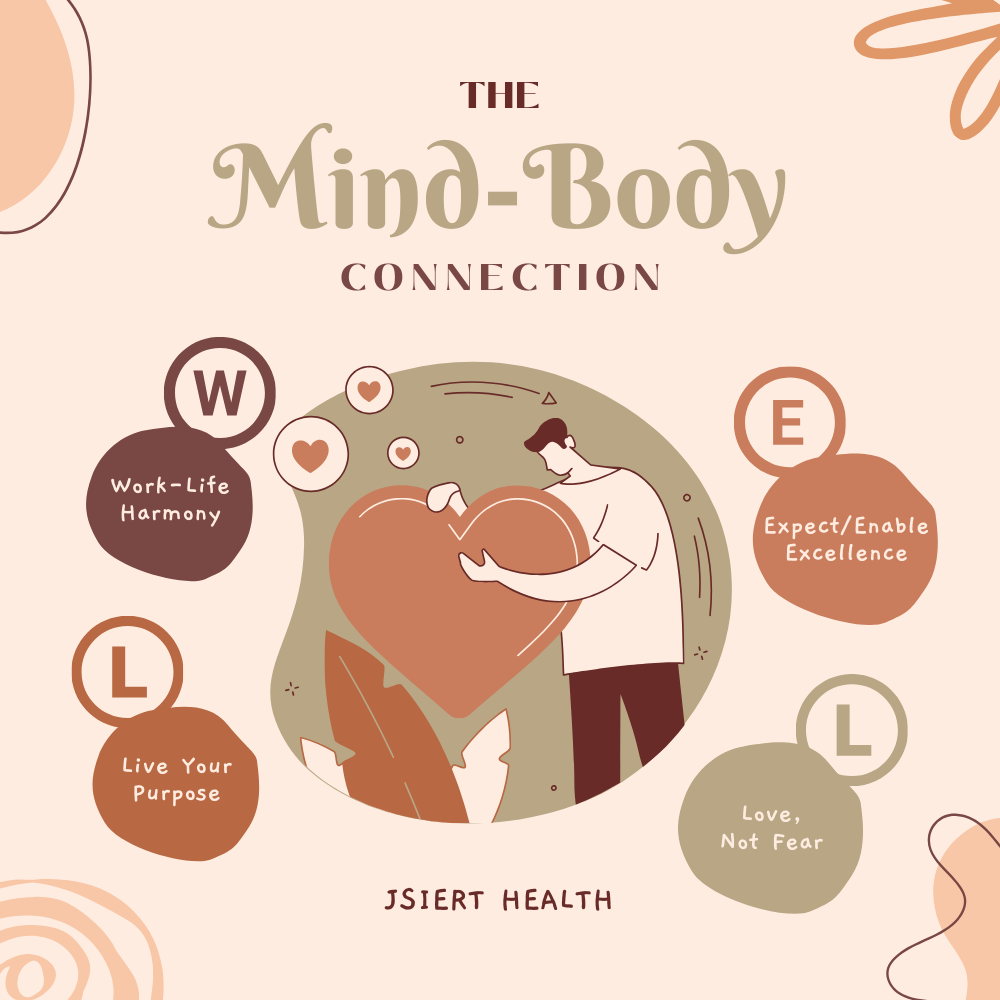
Stress and the Brain: Understanding the intricate relationship between stress and brain function, including the role of neurotransmitters and stress hormones.
The brain plays a central role in both perceiving and responding to stress. When an individual encounters a stressor, the brain’s limbic system, particularly the amygdala and hypothalamus, initiates the stress response by signaling the release of stress hormones such as adrenaline and cortisol from the adrenal glands. These hormones activate the body’s physiological stress response, leading to changes in heart rate, blood pressure, and energy metabolism. Chronic stress can alter brain structure and function, affecting areas involved in memory, emotion regulation, and decision-making, such as the hippocampus and prefrontal cortex. Moreover, prolonged exposure to stress hormones can impair synaptic plasticity and contribute to neurodegenerative processes. Understanding the neurobiological basis of stress can inform strategies for managing stress and promoting brain health.
The Gut-Brain Axis: Exploring the connection between gut health and mental well-being, and how diet influences stress levels.
The gut-brain axis refers to the bidirectional communication network between the gastrointestinal tract and the central nervous system, linking gut function to emotional and cognitive processes. Emerging research suggests that the gut microbiota, comprised of trillions of microorganisms residing in the intestines, plays a crucial role in regulating mood, behavior, and stress responses. Dysbiosis, or imbalance in the gut microbiome, has been associated with stress-related disorders such as anxiety and depression. Additionally, the gut microbiota produces neurotransmitters and metabolites that can influence brain function and stress sensitivity. Diet plays a key role in shaping the gut microbiome, with dietary factors such as fiber, prebiotics, probiotics, and fermented foods influencing microbial diversity and composition. Adopting a balanced and diverse diet rich in plant-based foods and fermented products can support gut health and resilience to stress.
The Power of Thoughts: Investigating the impact of cognitive patterns, beliefs, and mindset on stress perception and resilience.
The way individuals perceive and interpret stressors can significantly influence their stress responses and coping strategies. Cognitive patterns, beliefs, and mindset play a crucial role in shaping stress perception, resilience, and adaptive coping behaviors. Cognitive-behavioral theories emphasize the role of cognitive appraisals, or evaluations of the significance and controllability of stressors, in determining emotional and physiological responses to stress. Negative cognitive distortions, such as catastrophizing, overgeneralization, and personalization, can exacerbate stress reactions and contribute to maladaptive coping strategies. On the other hand, cultivating positive cognitive styles, such as optimism, self-efficacy, and resilience, can buffer against the impact of stress and foster adaptive coping mechanisms. Mindfulness-based approaches, cognitive restructuring techniques, and reframing strategies can help individuals challenge negative thought patterns and cultivate a more balanced and resilient mindset.
Stress and Sleep: Examining the bidirectional relationship between stress and sleep quality, and strategies for improving sleep hygiene.
Sleep plays a crucial role in regulating stress responses, emotional regulation, and overall well-being. Chronic stress can disrupt sleep patterns, leading to difficulties falling asleep, staying asleep, or achieving restorative sleep. Conversely, inadequate or poor-quality sleep can exacerbate stress levels and impair cognitive function, mood regulation, and immune function. The relationship between stress and sleep is bidirectional, with stress interfering with sleep and sleep disturbances increasing susceptibility to stress. Strategies for improving sleep hygiene include establishing a consistent sleep schedule, creating a relaxing bedtime routine, optimizing sleep environment (e.g., minimizing noise and light exposure), limiting screen time before bed, and practicing relaxation techniques such as deep breathing or progressive muscle relaxation. Additionally, addressing underlying stressors, managing stress through mindfulness or cognitive-behavioral interventions, and adopting healthy lifestyle habits can promote better sleep quality and resilience to stress.
3: Natural Stress Management Techniques
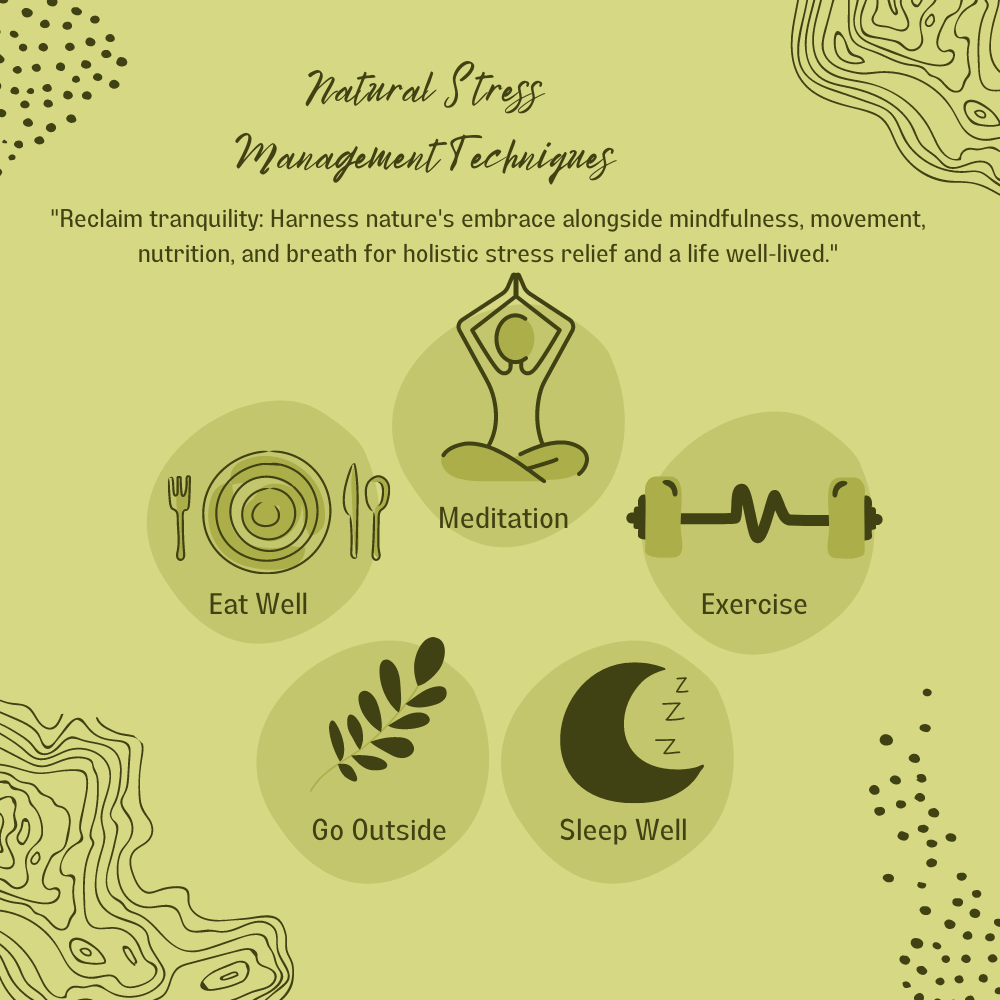
Breathing Techniques: Breathing exercises are powerful tools for stress management as they engage the parasympathetic nervous system, promoting relaxation and reducing the body’s stress response. Various techniques such as diaphragmatic breathing, where one focuses on deep, slow breaths that expand the diaphragm, can induce a state of calm. Box breathing involves inhaling, holding, exhaling, and holding the breath in equal counts, while alternate nostril breathing balances the left and right hemispheres of the brain, promoting mental clarity.
Mindfulness Meditation: Mindfulness meditation involves paying attention to the present moment without judgment. Guided meditations lead practitioners through visualizations or body scans, helping to anchor attention and cultivate awareness. Mindfulness-Based Stress Reduction (MBSR) techniques incorporate mindfulness into daily life, fostering a non-reactive, accepting attitude towards stressors. Practicing mindfulness meditation regularly can increase resilience to stress and improve overall well-being.
Nature Therapy: Spending time in nature has been shown to have numerous benefits for stress reduction and mental health. Forest bathing, or shinrin-yoku, involves immersing oneself in a natural environment and mindfully engaging with the sights, sounds, and smells of the forest. Gardening allows individuals to connect with the earth, fostering a sense of tranquility and connection to life. Outdoor recreational activities such as hiking or picnicking provide opportunities for physical activity and relaxation in natural surroundings.
Physical Activity: Exercise is a potent stress reliever, releasing endorphins and reducing levels of stress hormones like cortisol. Aerobic exercises such as running, swimming, or cycling increase heart rate and oxygen intake, promoting feelings of well-being. Strength training builds muscle strength and resilience, while mind-body practices like yoga and tai chi combine movement with mindfulness, enhancing relaxation and stress resilience.
Nutrition and Diet: The foods we eat can impact our stress levels and overall well-being. Stress-reducing foods such as leafy greens, fatty fish rich in omega-3 fatty acids, and antioxidant-rich fruits and vegetables can support the body’s stress response. Following dietary patterns like the Mediterranean diet, which emphasizes whole grains, lean proteins, and healthy fats, can reduce inflammation and promote a healthy gut-brain axis, which is crucial for managing stress.
Sleep Hygiene: Quality sleep is essential for stress management and overall health. Establishing a regular sleep schedule and bedtime routine signals to the body that it’s time to wind down. Sleep hygiene practices such as creating a comfortable sleep environment, limiting screen time before bed, and avoiding caffeine and heavy meals close to bedtime can improve sleep quality and duration.
Social Support and Connection: Maintaining strong social connections is vital for buffering against stress and promoting emotional well-being. Building social support networks through friendships, family relationships, or support groups provides opportunities for sharing experiences, seeking advice, and receiving emotional support during challenging times.
Creativity and Expression: Engaging in creative activities such as art therapy, music therapy, journaling, or expressive writing can be therapeutic for processing emotions and reducing stress. Creative expression allows individuals to explore their thoughts and feelings in a non-verbal way, fostering self-awareness and emotional release.
Time Management and Organization: Effective time management and organization strategies can help individuals feel more in control of their lives and reduce feelings of stress and overwhelm. Prioritizing tasks, setting realistic goals, and breaking projects into manageable steps can increase productivity and reduce procrastination.
Self-Compassion and Mindful Self-Care: Practicing self-compassion involves treating oneself with kindness and understanding, especially during times of stress or difficulty. Cultivating self-care habits such as setting boundaries, saying no when necessary, and prioritizing activities that nourish the mind, body, and spirit can foster resilience and well-being. Mindful self-care involves tuning into one’s needs and taking intentional actions to promote self-care and well-being.
4: Integrating Stress Management into Daily Life
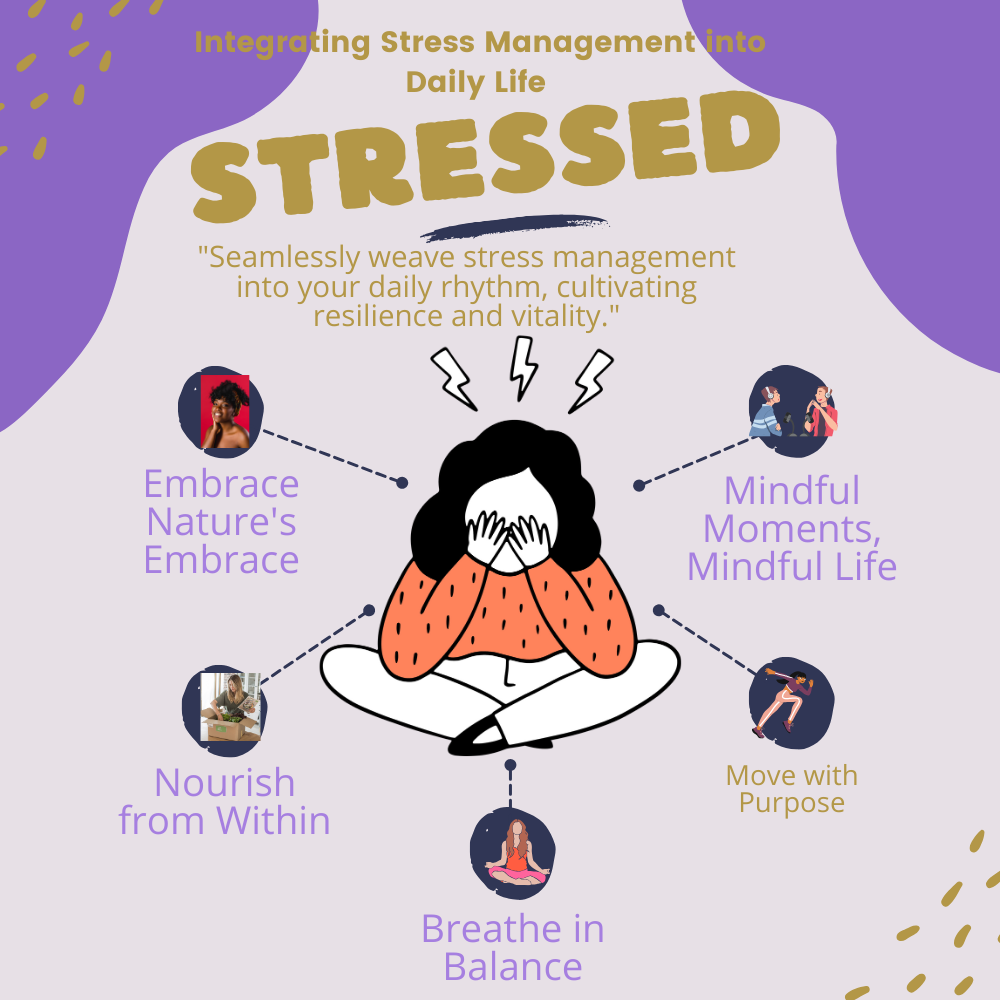
Creating a Personalized Stress Management Plan
Guiding readers through the process of identifying stressors, assessing coping strategies, and developing a tailored stress management plan.
- Identifying Stressors: Encourage readers to reflect on their daily life and identify specific stressors that trigger feelings of anxiety, tension, or overwhelm. Stressors may include work deadlines, relationship conflicts, financial worries, or health concerns.
- Assessing Coping Strategies: Guide readers in evaluating their current coping mechanisms and their effectiveness in managing stress. Encourage them to identify both adaptive coping strategies (e.g., deep breathing, exercise, mindfulness) and maladaptive coping mechanisms (e.g., avoidance, substance use) that may exacerbate stress.
- Developing a Plan: Help readers develop a personalized stress management plan tailored to their unique needs and preferences. This plan may include a combination of stress reduction techniques, self-care practices, and lifestyle modifications aimed at mitigating stressors and promoting resilience.
Implementing Healthy Habits
Providing practical tips for integrating stress management techniques into daily routines, including morning rituals, mindfulness breaks, and relaxation practices.
- Morning Rituals: Encourage readers to start their day with calming and centering activities, such as meditation, yoga, or journaling, to set a positive tone for the day ahead.
- Mindfulness Breaks: Suggest incorporating short mindfulness breaks throughout the day to pause, breathe, and cultivate present-moment awareness. These breaks can be as simple as taking a few deep breaths, practicing mindful walking, or observing sensory experiences.
- Relaxation Practices: Recommend incorporating relaxation techniques into daily routines to promote stress relief and mental clarity. This may include progressive muscle relaxation, guided imagery, or listening to calming music before bedtime.
Overcoming Barriers to Change
Addressing common challenges in maintaining stress management habits, such as time constraints, motivation issues, and resistance to change.
- Time Management: Provide strategies for prioritizing tasks, setting realistic goals, and managing time effectively to make room for stress management activities. Encourage readers to schedule regular breaks and self-care practices amidst their busy schedules.
- Motivation: Offer encouragement and support to help readers stay motivated in their stress management efforts. Emphasize the importance of self-compassion and celebrating small victories along the way.
- Resistance to Change: Acknowledge that change can be challenging and may elicit resistance or discomfort. Encourage readers to approach stress management as an ongoing process of self-discovery and growth, rather than a quick fix solution.
Seeking Professional Support
Recognizing when to seek professional help for chronic stress, anxiety disorders, or other mental health concerns, and the importance of therapy, counseling, or medical intervention when needed.
- Signs of Distress: Educate readers about the signs and symptoms of chronic stress, anxiety disorders, and other mental health conditions, such as persistent worry, insomnia, changes in appetite, or difficulty functioning in daily life.
- Importance of Professional Support: Emphasize the importance of reaching out to qualified mental health professionals, such as therapists, counselors, or psychiatrists, for assessment, diagnosis, and treatment of mental health concerns.
- Stigma Reduction: Challenge stigma surrounding mental health issues and encourage open dialogue about seeking help for stress-related symptoms. Provide resources and referrals to reputable mental health services and support organizations.
5: The Science of Stress Reduction
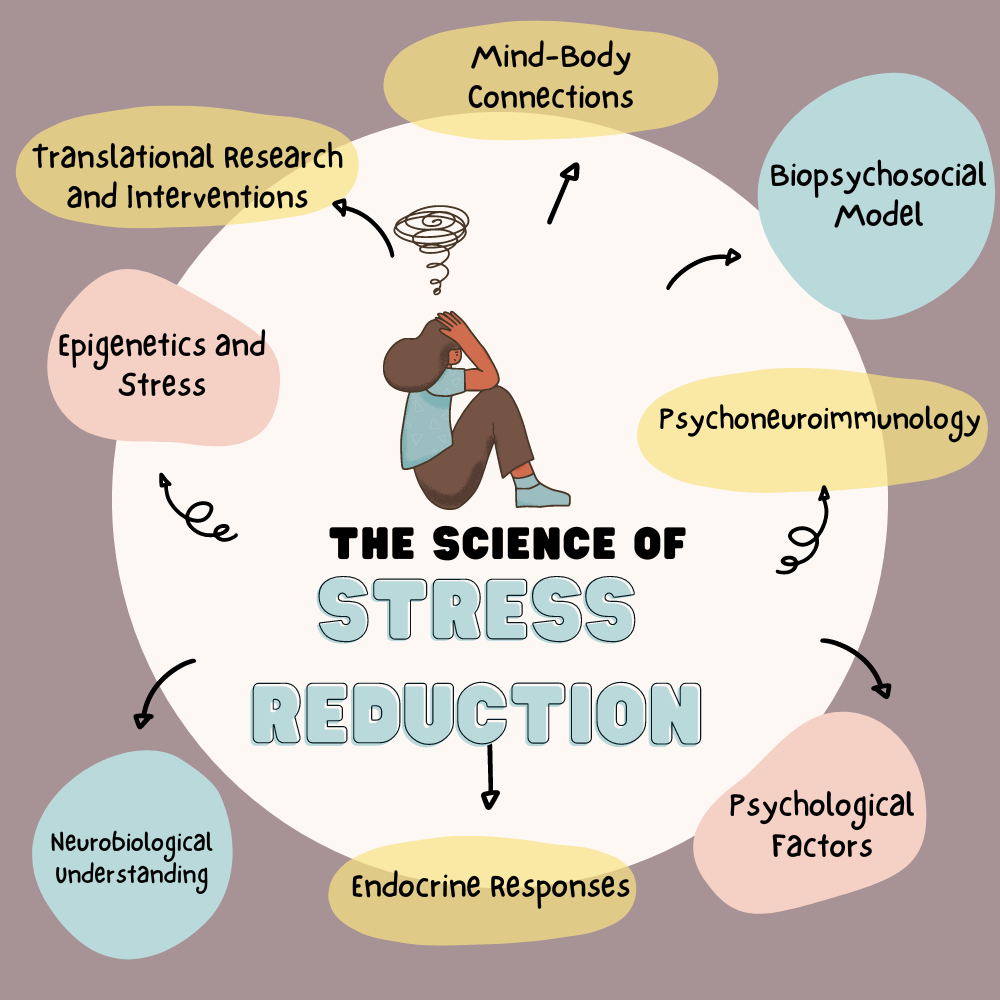
Evidence-Based Approaches: Scientific research provides robust evidence supporting the efficacy of various natural stress management techniques. Studies on mindfulness meditation have demonstrated its ability to reduce stress, anxiety, and depressive symptoms while improving overall well-being and quality of life. Nature therapy research indicates that spending time in natural environments can lower cortisol levels, reduce blood pressure, and enhance mood. Similarly, exercise interventions, including aerobic exercises, strength training, and mind-body practices like yoga, have been shown to alleviate stress and improve mental health outcomes. Nutrition research highlights the importance of dietary patterns rich in fruits, vegetables, whole grains, and healthy fats for stress resilience and brain health. Additionally, studies investigating the mind-body connection have elucidated the role of practices such as deep breathing, progressive muscle relaxation, and guided imagery in modulating stress responses and promoting relaxation.
Neurobiology of Stress: Understanding the neurobiological mechanisms underlying stress responses sheds light on how stress affects the brain and body. Chronic stress activates the hypothalamic-pituitary-adrenal (HPA) axis, leading to the release of stress hormones like cortisol, which can have damaging effects on brain structure and function. Prolonged cortisol exposure can impair hippocampal neurogenesis, disrupt neurotransmitter balance, and increase vulnerability to mood disorders such as depression and anxiety. However, stress reduction techniques like mindfulness meditation, nature therapy, and exercise have been shown to mitigate these neurobiological effects by modulating stress hormone levels, promoting neuroplasticity, and enhancing resilience to stress.
Psychoneuroimmunology: The field of psychoneuroimmunology explores the intricate connections between the nervous system, the endocrine system, and the immune system in response to stress. Chronic stress dysregulates immune function, leading to increased susceptibility to infections, inflammatory disorders, and autoimmune diseases. Stress-induced activation of pro-inflammatory pathways contributes to systemic inflammation, which underlies many chronic health conditions. Conversely, stress reduction techniques such as mindfulness meditation, nature therapy, and social support have been found to dampen inflammation, enhance immune function, and promote overall health and well-being. By modulating stress-related immune responses, these interventions can help prevent and manage a range of physical and mental health disorders, supporting longevity and vitality.
In summary, the science of stress reduction provides compelling evidence for the effectiveness of natural stress management techniques in promoting health and well-being. By harnessing the power of mindfulness, nature, exercise, nutrition, and the mind-body connection, individuals can cultivate resilience to stress, enhance brain function, and foster a state of balance and vitality. Incorporating evidence-based stress reduction practices into daily life can lead to profound improvements in physical, mental, and emotional health, empowering individuals to thrive in the face of life’s challenges.
6: Cultivating Resilience and Well-Being
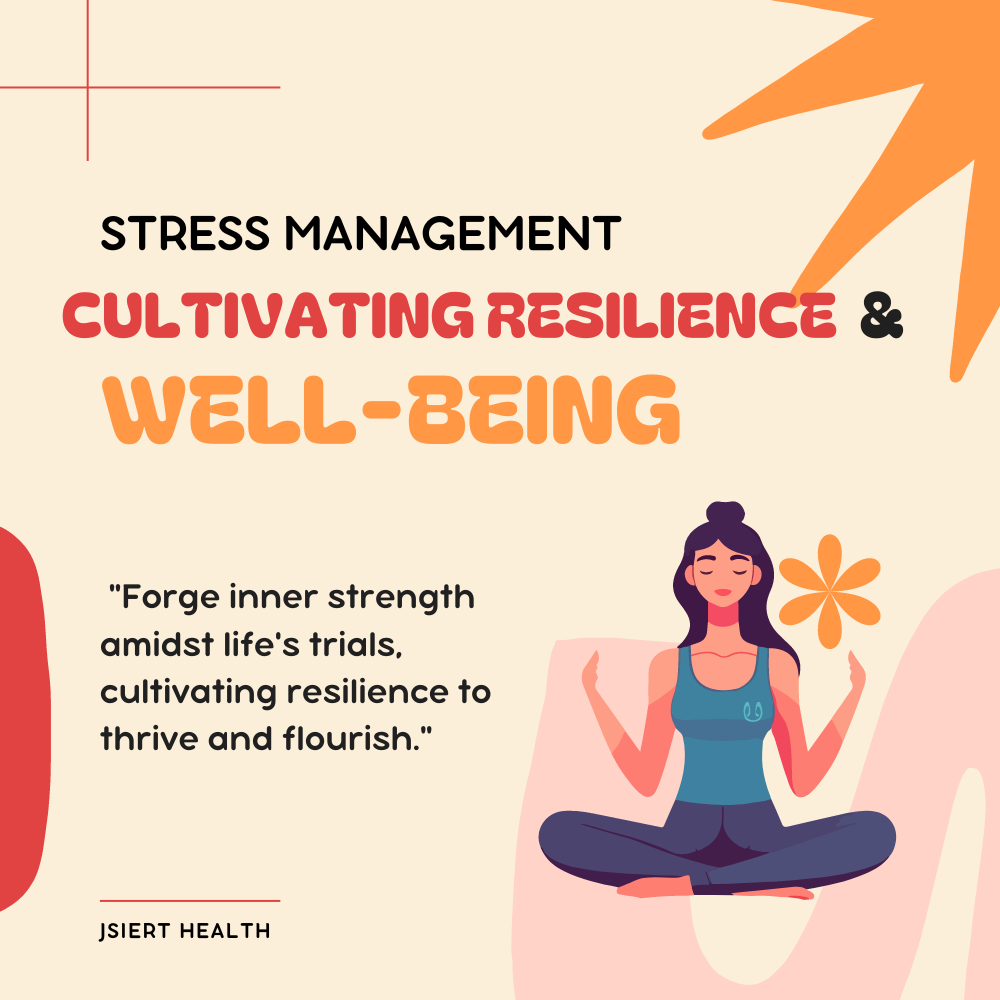
Building Resilience: Resilience is the ability to adapt and bounce back from challenges, adversity, and stressors. It involves developing positive coping skills, maintaining optimism, and fostering a sense of self-efficacy. Strategies for building resilience include:
- Positive Coping Skills: Encouraging individuals to develop adaptive coping strategies such as problem-solving, seeking social support, and practicing self-care. By learning to effectively manage stressors and challenges, individuals can build resilience and navigate adversity more effectively.
- Optimism: Cultivating a positive outlook and reframing setbacks as opportunities for growth and learning. Optimistic individuals tend to approach challenges with confidence and persistence, which enhances their resilience in the face of adversity.
- Self-Efficacy: Building belief in one’s ability to overcome obstacles and achieve goals. Developing self-efficacy involves setting realistic goals, taking proactive steps towards success, and celebrating achievements, no matter how small.
Enhancing Emotional Intelligence: Emotional intelligence (EQ) refers to the ability to recognize, understand, and manage emotions in oneself and others. It plays a crucial role in stress management and overall well-being. Components of emotional intelligence include:
- Self-Awareness: Encouraging individuals to recognize and understand their own emotions, strengths, and limitations. Self-awareness enables individuals to identify stress triggers and implement effective coping strategies.
- Self-Regulation: Teaching individuals to manage their emotions and impulses in healthy and constructive ways. By practicing self-regulation techniques such as deep breathing, mindfulness, and relaxation exercises, individuals can reduce stress and enhance emotional resilience.
- Empathy: Fostering empathy towards others’ experiences and emotions. Empathetic individuals are better equipped to offer support and understanding to others, which strengthens social connections and promotes overall well-being.
- Social Skills: Developing effective communication, interpersonal, and conflict resolution skills. Strong social skills facilitate positive relationships and networks of support, which are essential for coping with stress and building resilience.
Finding Meaning and Purpose: Finding meaning and purpose in life provides a sense of direction, fulfillment, and resilience in the face of adversity. Strategies for aligning values with actions and cultivating meaning include:
- Clarifying Values: Helping individuals identify their core values and priorities in life. By aligning actions and decisions with their values, individuals can create a sense of purpose and direction that guides them through difficult times.
- Setting Meaningful Goals: Encouraging individuals to set goals that are personally meaningful and aligned with their values. Meaningful goals provide a sense of purpose and motivation, even in the face of setbacks and challenges.
- Engaging in Purposeful Activities: Encouraging individuals to engage in activities that bring meaning and fulfillment, such as volunteering, pursuing hobbies, or contributing to causes they care about. These activities nurture a sense of connection, purpose, and resilience in life.
7: Beyond Stress Management: Thriving in Life

Pursuing Passion and Purpose: Encouraging readers to identify their passions and pursue meaningful goals aligned with their values and interests is crucial for fostering a sense of fulfillment and purpose in life. When individuals engage in activities that resonate with their passions, they experience a deep sense of satisfaction and motivation. By setting meaningful goals and taking steps towards realizing their dreams, individuals can cultivate a sense of purpose that fuels their resilience and perseverance in the face of challenges.
Cultivating Gratitude and Joy: Gratitude practices and positive psychology interventions have been shown to have profound effects on well-being and happiness. By regularly acknowledging and appreciating the positive aspects of life, individuals can shift their focus from what they lack to what they have, fostering a sense of abundance and contentment. Savoring experiences, whether big or small, allows individuals to fully immerse themselves in moments of joy and appreciation, enhancing their overall satisfaction with life.
Fostering Connection and Community: Humans are social beings wired for connection, and fostering meaningful relationships and community ties is essential for happiness and resilience. By nurturing social support networks, individuals can lean on others for emotional support, encouragement, and companionship during difficult times. Belongingness and altruism contribute to a sense of purpose and fulfillment, as individuals experience the joy of giving back and making a positive impact in the lives of others.
Embracing Change and Adaptability: Life is inherently unpredictable, and developing psychological flexibility is key to thriving in the face of change, uncertainty, and life transitions. By cultivating an attitude of openness, acceptance, and adaptability, individuals can navigate challenges with resilience and grace. Rather than resisting change, they embrace it as an opportunity for growth, learning, and personal development. By remaining flexible and adaptable, individuals can weather life’s storms with resilience and emerge stronger and more resilient than before.
In conclusion, beyond stress management lies the opportunity to truly thrive in life by pursuing passions and purpose, cultivating gratitude and joy, fostering connection and community, and embracing change and adaptability. By incorporating these principles into their daily lives, individuals can unlock their full potential, cultivate resilience, and experience greater fulfillment, happiness, and well-being.
Conclusion
In conclusion, mastering stress is not about eliminating stressors from our lives, but rather about cultivating resilience, self-awareness, and healthy coping strategies to navigate life’s challenges with grace and vitality. By integrating natural stress management techniques into our daily lives and nurturing our mind, body, and spirit, we can thrive amidst adversity and live our best lives.
REFERENCES:
To learn about natural stress management techniques, consider exploring the following reputable sources:
- Websites and Health Portals:
- Books:
- “The Relaxation and Stress Reduction Workbook” by Martha Davis, Elizabeth Robbins Eshelman, and Matthew McKay.
- “The Anxiety and Phobia Workbook” by Edmund J. Bourne.
- “10% Happier: How I Tamed the Voice in My Head, Reduced Stress Without Losing My Edge, and Found Self-Help That Actually Works–A True Story” by Dan Harris.
- Scientific Research and Journals:
- PubMed (https://pubmed.ncbi.nlm.nih.gov/)
- Journal of Psychosomatic Research
- Journal of Alternative and Complementary Medicine
- Wellness Apps and Online Programs:
- Headspace: Meditation & Sleep
- Calm: Meditation and Sleep Stories
- Insight Timer: Free Meditation App
- Online Communities and Forums:
- Reddit’s r/Stress community (https://www.reddit.com/r/stress/)
- The Anxiety and Depression Association of America (ADAA) online community (https://adaa.org/adaa-online-support-group)
- Podcasts and Interviews:
- The Stress Less Show with David C. Hauser offers insights and strategies for managing stress.
- The Science of Happiness podcast by Greater Good Science Center explores research-based practices for well-being.
These resources offer evidence-based techniques for managing stress naturally, including mindfulness meditation, deep breathing exercises, physical activity, and relaxation techniques. It’s important to find techniques that resonate with you and incorporate them into your daily routine for effective stress management and improved overall well-being.
FAQ for Top 5 Natural Stress Management Techniques for Your Best Life
1.What are natural stress management techniques?
Natural stress management techniques are approaches to reducing and coping with stress that involve using methods derived from nature or that work in harmony with the body’s natural rhythms and processes. These techniques often include practices such as breathing exercises, mindfulness meditation, spending time in nature, physical activity, and dietary changes.
2. How do breathing techniques help in stress management?
Breathing techniques, such as diaphragmatic breathing or deep breathing, can help calm the nervous system and reduce stress by activating the body’s relaxation response. These techniques involve slow, deep breaths that engage the diaphragm and promote relaxation, helping to alleviate feelings of tension and anxiety.
3.What is mindfulness meditation, and how does it reduce stress?
Mindfulness meditation is a practice that involves focusing one’s attention on the present moment without judgment. By cultivating mindfulness through meditation, individuals can develop greater awareness of their thoughts, emotions, and bodily sensations, which can help them respond to stressors more effectively and reduce overall stress levels.
4. How does spending time in nature help with stress management?
Spending time in nature, also known as nature therapy or ecotherapy, has been shown to have numerous benefits for reducing stress and promoting overall well-being. Nature has a calming effect on the mind and body, reducing cortisol levels and promoting relaxation. Activities such as forest bathing (shinrin-yoku), gardening, or simply being outdoors can help individuals disconnect from everyday stressors and reconnect with the natural world.
5. Why is physical activity important for stress relief?
Physical activity, including aerobic exercises, strength training, yoga, and tai chi, can help reduce stress by releasing endorphins, the body’s natural feel-good chemicals. Exercise also helps to improve mood, increase energy levels, and promote relaxation, making it an effective strategy for managing stress and improving overall well-being.
6. How does nutrition and diet impact stress levels?
Nutrition and diet play a significant role in stress management, as certain foods and dietary patterns can either contribute to or alleviate stress. Consuming a balanced diet rich in fruits, vegetables, whole grains, lean proteins, and healthy fats can provide essential nutrients that support the body’s stress response and promote overall health. Conversely, consuming excessive amounts of caffeine, sugar, or processed foods may increase stress levels and contribute to feelings of anxiety or fatigue.
7. How can I incorporate these natural stress management techniques into my daily life?
Incorporating natural stress management techniques into your daily routine can be as simple as setting aside a few minutes each day for deep breathing exercises or mindfulness meditation. You can also make time to engage in physical activity outdoors, such as going for a walk or practicing yoga in a natural setting. Making small changes to your diet, such as incorporating more fruits and vegetables or drinking herbal tea, can also support your body’s ability to cope with stress.
8. Are there any potential risks or contraindications to these techniques?
While natural stress management techniques are generally safe for most people, it’s essential to listen to your body and consult with a healthcare professional if you have any underlying health conditions or concerns. Some breathing techniques or physical activities may not be suitable for everyone, so it’s essential to choose techniques that feel comfortable and safe for you. If you experience any discomfort or adverse reactions while practicing these techniques, stop immediately and seek guidance from a qualified professional.